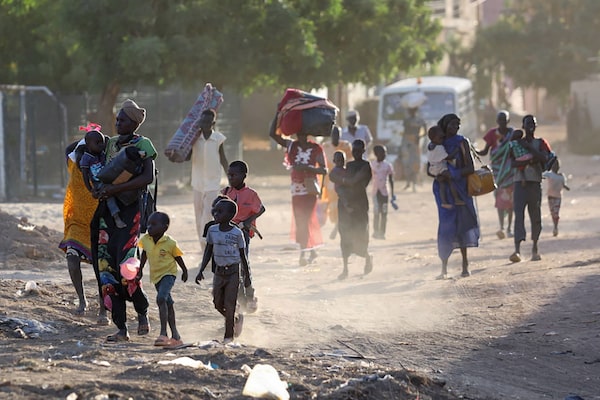
People flee their neighbourhoods amid fighting between the army and paramilitaries in Khartoum on April 19.-/AFP/Getty Images
Hundreds of Canadians in Sudan are trapped in their homes, running out of water and medicine after five days of heavy battles, as Western governments failed to make progress in early attempts to evacuate their citizens.
Community leaders in Canada said they are hearing desperate stories from Sudanese-Canadians in the capital, Khartoum, including some who were forced to collect water from the Nile River because of the collapse of water supplies. Others are rationing their water, a sip at a time, because they are unable to leave their homes.
Foreign governments are working on plans to evacuate their citizens, but the main airport in Khartoum is badly damaged and still caught in the crossfire between the two warring sides: the Sudanese military and a paramilitary force known as the Rapid Support Forces (RSF).
Diplomats, humanitarian workers and other foreign residents in Sudan have been targeted in attacks by armed fighters, heightening the urgency of the evacuation plans. One European diplomat was attacked in his home, a U.S. diplomatic convoy was hit with gunfire, and three United Nations aid workers have been killed.
A total of 1,535 Canadian citizens in Sudan are registered with the federal government, according to Global Affairs Canada, although the true number is believed to be higher since registration is voluntary.
The government went onto social media on Wednesday to appeal to Canadians in Sudan to register. “This allows us to directly notify you as the situation evolves and let you know how we can help,” the message said.
Sudan’s conflict explained: What’s behind the latest fighting?
Germany attempted to send three military transport planes to Khartoum to evacuate about 150 of its citizens, but the mission was halted, German media reported on Wednesday.
The Japanese government said it is planning to send a military plane to Sudan to evacuate about 60 of its citizens, but there was no indication that the flight was under way. The United States said it had no plans for evacuation flights at this point.
The Globe and Mail sent queries to Global Affairs Canada about the possibility of evacuation flights, but the department did not answer the question.
The department said the Canadian embassy in Khartoum has shut down because of the security situation and its staff have taken shelter, but they are all safe and accounted for. The embassy is securing access to food, water and fuel for the Canadian staff and is also trying to support its locally hired staff, the department told The Globe.
In total, almost 300 people have been killed and more than 3,000 injured in the power struggle between the military and RSF that erupted on Saturday, according to the World Health Organization. Several attempted ceasefires, including one on Wednesday night, were rapidly broken by gunfire and explosions.
In a message to its citizens in Sudan this week, the Canadian embassy warned that the situation is highly volatile and the clashes are likely to continue or worsen. There have been reports of attacks and sexual assaults, including rapes, it said. It urged Canadians to lock their doors and stay away from windows. Access to food, water and fuel is difficult, the message said.
“A man from Toronto told me that he drove with two of his cousins to the Nile to bring water to their family,” said Lubna Ahmed, a member of the Sudanese-Canadian community.
“Water taps have stopped in half of the city, and people are getting their water directly from the Nile,” she told The Globe, referring to Khartoum. “It depends on their luck whether they get the water or get killed in the journey.”
Many people are afraid to leave their homes because gunfire could break out at any moment. “My aunt’s blood-pressure medication has run out, and all the nearby pharmacies are closed and there’s no way to reach the other ones,” Ms. Ahmed said. “A Canadian woman doing volunteer work in Sudan told me that she is still taking cover with her grandmother.”
Ashraf alTahir, president of the Sudanese Canadian Communities Association, said there are many stranded Sudanese-Canadians although he does not have an exact number. He received a message from one Sudanese-Canadian woman who was visiting the country and is now stranded there, with her water supply running out. To survive, she is taking just a sip of water at a time, he told The Globe.
“We have women over there, we have people with special needs over there right now, we have some seniors over there. Our main concern right now is that they are stranded and they don’t know where to go, and people right now are talking about survival.”
He said his organization is gathering information from its local chapters across Canada, so that it can provide names and other details to assist in any evacuation.
The International Committee of the Red Cross said there are bodies lying in the streets of Khartoum because it is too dangerous to collect them. Many hospitals have shut down because of a lack of medical supplies, and relief agencies have been looted.
“My biggest fear is that the health care system collapses, and the consequences will be catastrophic,” said Osama Abubakr Osman, a spokesperson for the Sudanese Red Crescent Society, in a statement on Wednesday.
“Health care workers cannot reach hospitals, and hospitals are trying to attend to their patients without electricity and water and running critically short of essential supplies.”
 Geoffrey York
Geoffrey York Janice Dickson
Janice Dickson